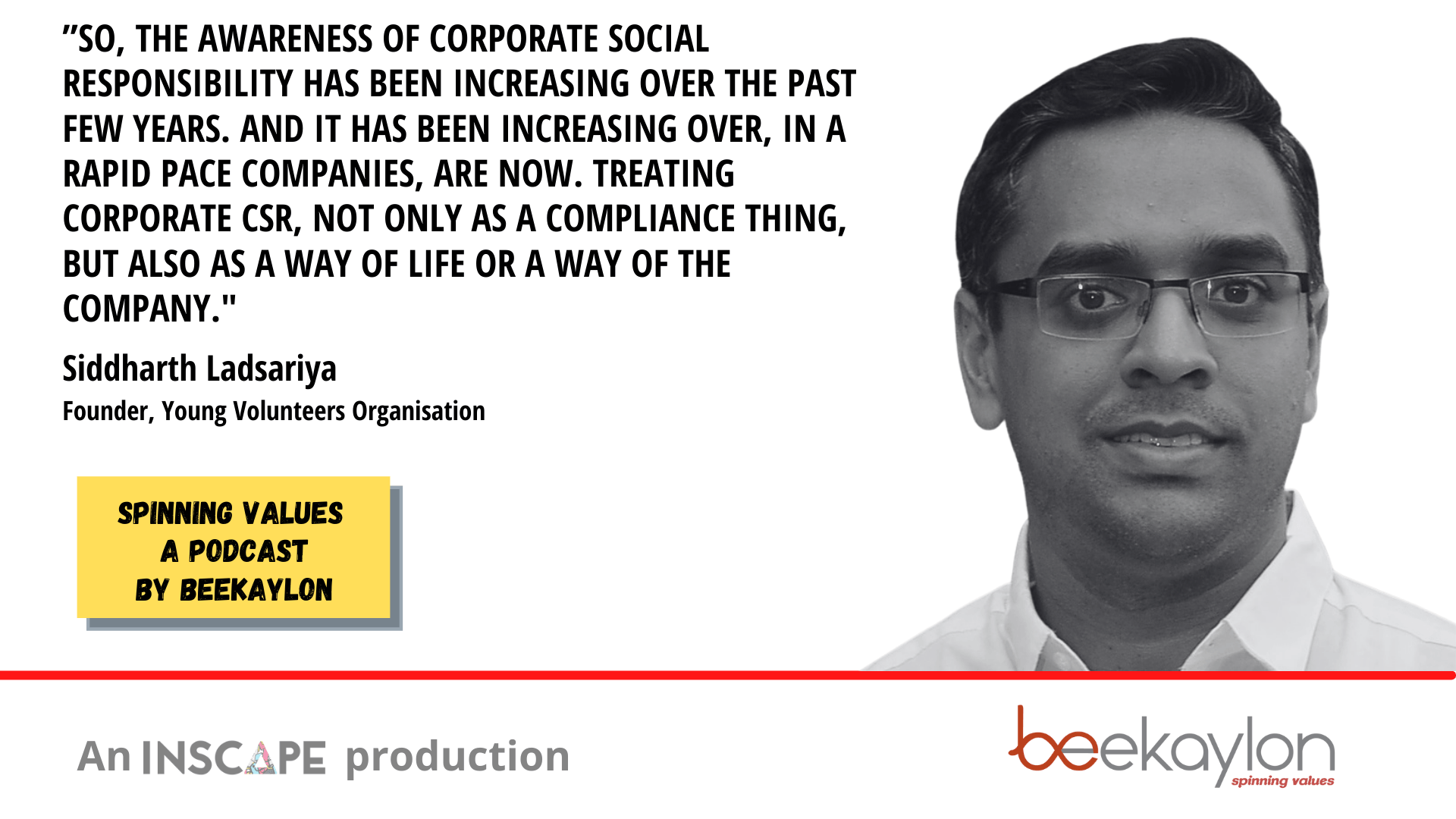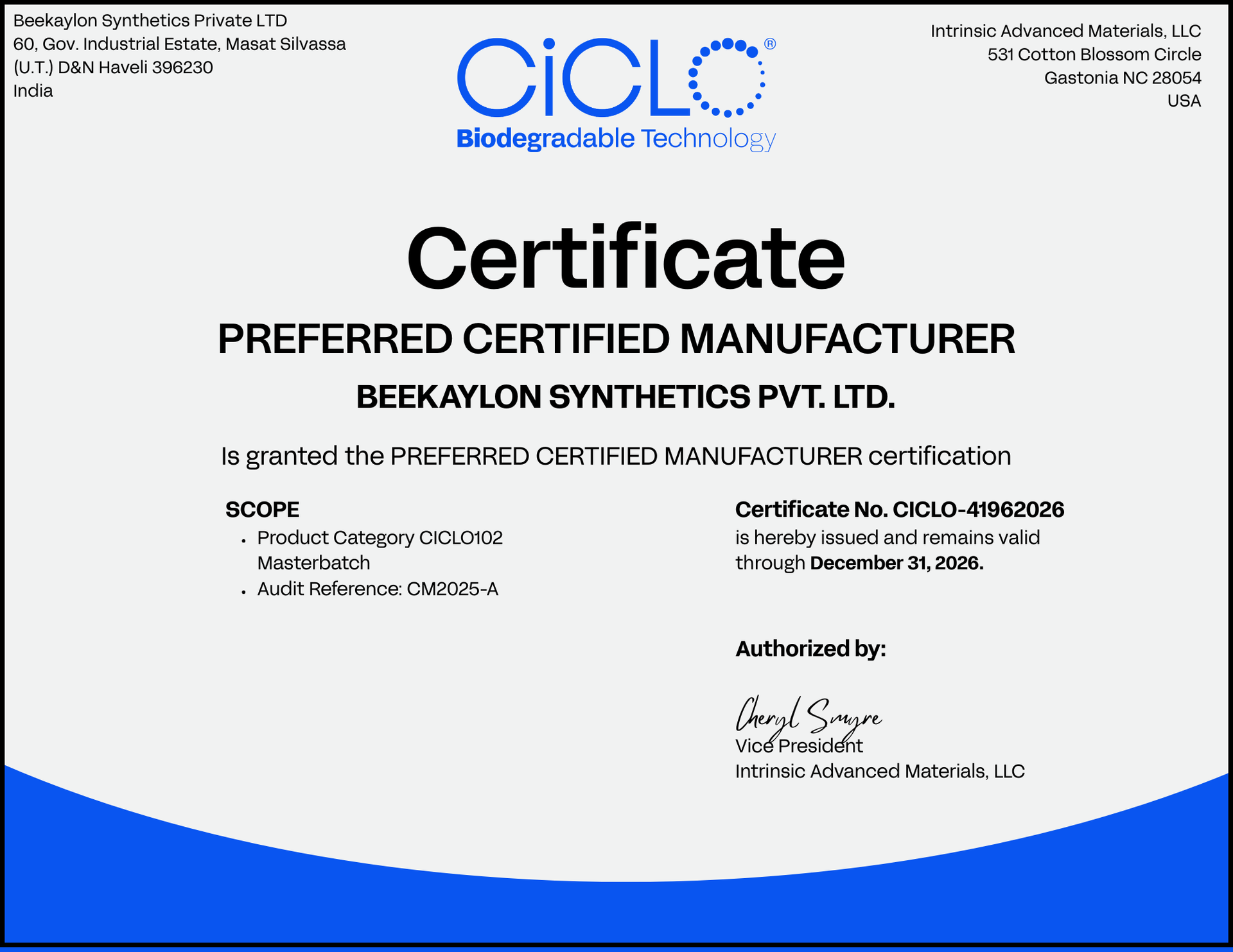Spinning Values Podcast: Ep. 4 - Giving back to society through volunteering
Small Act - Big Impact :
In conversation with Siddharth Ladsariya,
Founder, Young Volunteers Organisation

Spinning Values Podcast: Episode 4
Listen to Siddharth Ladsariya, as we discuss volunteering & CSR.
With a raging pandemic, volunteering and CSR have become crucial in contributing to the communities that businesses operate in. Is it time to give back and build some good karmas? Do subscribe to this podcast on your favourite podcast app.Transcript of the Conversation with Siddharth Ladsariya, YVO.
Siddharth Ladsariya
We definitely started off with the platform just to connect, donors or volunteers with, people doing actual good work on the ground. But today we have evolved ourselves as a platform where any youth, who wants to do anything good for society? he joins YVO. He sees YVO, he understands how good and how nice it feels to do good for society, whether in a small way or in a bigger way. And we encourage, and we facilitate him to live his dreams and passions towards betterment of society.
Rajeev
This is spinning values brought to you by Beekaylon. And you're listening to Rajiv. We have a special guest on our show today, who's unlike any other previous guests, It has nothing to do with synthetic yarn, but it is all about change. Someone who believes that even a small thing you do to change the world around you, can have a significant impact. Let us meet Siddharth Ladsariya, one of the founding members of Y V O young volunteers organization. YVO's mission is to be the social impact platform of choice for donors and young volunteers by showing them that even the smallest act can make a large impact to India's development. Thanks Siddharth. Thanks for coming on the show. spinning values, powered by Beekaylon.
Siddharth Ladsariya
Thank you Rajeev for having me here.
Rajeev
So we've been doing phone tag or email tag for quite some time. Right. So it's finally good to talk to you.
Siddharth Ladsariya
Pleasure.
Rajeev
Thanks Siddharth. Thanks for coming on the show. this episodes a bit different from the other ones that we've done so far, which is really focused on the product side, so the inspiration for this episode came from Shohin where he suggested that let's do an interview. or an episode, which is outside of what we do, and that's how I got in touch with you and this whole thing happened. so just to start off with, can you just, tell our viewers something about you, and the organizations that you lead.
Siddharth Ladsariya
Yeah. So thank you, Rajiv. My name is Siddharth Ladsariya born and brought up in Mumbai, pursued my engineering. Worked for a couple of years at ICICI bank. And then did my MBA from the U S. And, since coming back from the U S I have been actively investing in startups in India, invested in more than 150 startups, and also, run a company called Everest fleet, which is, one of the larger fleet management companies in India, employing more than 1,500 people.
Rajeev
what inspired you to start, a young volunteers organization?
Siddharth Ladsariya
All right. So while I was studying in the us, I often, seeing the youth there, the children the young adults, they were always very deeply involved in giving back to society in whichever way, whichever form, and for some reason, growing up in India, we never felt this from our heart within that, we, young professionals, especially educated people that we never got the opportunity or we never found a way how to give back to society.
So I've seen them. it was really an eye opener that, if, every individual, every youth is involved. And pretty deeply in giving back. So that, with that thought, started off thinking that how can we create such a, such a thought process in, in the youth of, India and a few years later over a casual conversation with friends.
We started brainstorming on how we can, replicate or how we can make this, successful in India. we identified three major constraints why we were not being able to, get involved in, giving back. One was that young professionals do not have time. They're all building their careers.
Time is extremely precious thing for them. They don't have large amounts of money where they can, go out and, extend, spend significant amount of time for donating that money. And thirdly, the transparency bit that in India, generally the word NGO because of, small, negative instances, the trust levels were not as great So with this, we started off and, try to get, people more and more involved. we have more than 60 volunteers. Typically they're professionals, startup entrepreneurs, businessmen, lawyers, doctors, et cetera. we told them that the kind of time commitment that we expect out of our volunteers is something in that in the four to six hours a month, which was something which was easily digestible by most people.
So we solved the problem of time that, we don't expect you to give more than, this many hours. Of course, if anyone is more passionate and they can spend the kind of bandwidth they're free to do, that was one part. Money. We started off with, why don't you donate 306 rupees every month, which is a small amount of money for most, youth in India.
but the donation, let us try to do it, sustainably, let us try to donate every month. This 306 over a period of time, we made it 506 rupees. And again, we solve that. You don't need to, give large amounts of money or you don't need to, you can just give small amounts of money in a sustainable fashion.
This eventually took the, to the form of, becoming an SIP of good Karma's as we like to call it that, systematic investment plan for good karmas. what we try to tell all our people was this small act of yours, of 306 or 506 rupees can create a big impact collectively. So, our tagline of YVO small act big impact.
Then third coming to transparency. We were very lucky to have, mentors, very good mentors, for us who guided us and told us how to address each of these problems. So, We do an exhaustive, due diligence on any NGO that we donate to, before donating and even after donating and even six months after donating to ensure that all the money has been rightly utilised.
We're also advised that, why don't we make our organization a zero admin cost organization, which is that not even one rupee we take from the donors to run this organization, that organization is run by the volunteers ourselves. And that's how we became a zero admin cost organization.
so we only donated for sustainable causes. When I say sustainable, it means that you not teach a person how to fish, but don't give him fish to eat. So typically causes, which resonate to us was education skilling women environment, water conservation, all the causes, which changes the life of a person for a long period of time for our family for a long period of time.
I would like to take this opportunity to give an example of a few, causes that we've donated to the first donation that we made was the amount of 40,000 rupees, six years ago. was an organization called Snehalay, what they were doing was they were rehabilitating women from the sex trade into mainstream society.
But when these women came into mainstream society, they realized that they don't have any skill to earn a living. So, Snehalay was involved in teaching them how to sew and, So then they can learn, sewing and make a living for themselves and come back to mainstream society. And we donated sewing machines for that cause, and today after six years, we are proud to say that thousands of women have been rehabilitated from that trade into mainstream society, living a dignified and honorable life.
one of the NGOs that we donated to was Deeds where they are involved in training deaf and dumb youth into becoming, waiters and chefs in restaurants. And then they are placed into restaurants. So suddenly an individual who was not contributing to a family in terms of financial or monetary, suddenly he became a bread earner for that family.
An organization where we donated, called Keshav Shristi. They teach women how to make bamboo handicrafts in, villages and tribal areas. Now, these women, by making these bamboo handicrafts and selling them into the market, they increase their family earning of around seven to 10,000 rupees a month, which is a huge amount of money. And with this money, they can spend it on their children's education or their own health. So, these are some causes that we have been donated to. As I told you, transparency touching back on that subject, we ensure that all our bank statements are uploaded on our website each and every receipt that we get is uploaded on our website.
We inform the donors every month, by an email or a WhatsApp, on how each and every rupee was utilized and how many lives it impacted and how it impacted them. so, our donors have really appreciated the level of transparency that we have been following and their trust on us has only been increasing with time.
Rajeev
It seems to me that your organizations is more like a bridge between, NGO, which are actually doing some really good work, at various levels and. People who want to invest or donate their time or resources to those causes. Am I right in saying that?
Siddharth Ladsariya
Yes, you have hit it exactly. Right. this is what we do. So, Definitely a bridge. But now with time we have also evolved into a few initiatives. so we started off a six and a half years back with 40,000 rupees a month. Today we are donating 10 lakh rupees a month. We started off at 15 odd volunteers. Today, we have 60 plus volunteers. Now, these volunteers that we got, they realized that, with time that, giving back to society was actually a good thing and they started enjoying it. So then these volunteers of ours, they wanted to unleash their energies into giving back to society. So each one of them had some certain passion or the other.
So let me give you an example of one volunteer of ours. She lost her sister to a road accident in the U S when they went to claim the body, they realize that the system had already pledged her organs. which none of the family members knew. she got so passionate about that. Cause that she started, organ donation, vertical within, YVO and now she lives her passion by encouraging and, spreading awareness for organ donation.
A few of our volunteers were very passionate about helping animals. So we started a vertical called love for animals, within YVO. in this pandemic, a lot of our volunteers, they really resonated with the cause of mental wellbeing and wellness. So we started a mental wellbeing, vertical, one more vertical that a few of our volunteers started was a future leaders program where we go and train students, the youth and educated professionals to become empathetic citizens of the future
So we definitely started off with the platform just to connect, donors or volunteers with, people doing actual good work on the ground. But today we have evolved ourselves as a platform where any youth, who wants to do anything good for society? he joins YVO. He sees YVO, he understands how good and how nice it feels to do good for society, whether in a small way or in a bigger way.
And we encourage, and we facilitate him to live his dreams and passions towards betterment of society.
Rajeev
That's pretty awesome to hear, sidd. Just amazing you work that have been doing since the beginning. What about the pandemic and its effects and. How has YVO and your volunteers helped in this regard? Can you talk about some of the initiatives that you have done in this space?
Siddharth Ladsariya
Firstly, this pandemic is nothing short of world war three that we've gone through. So every NGO, every individual, every person has tried his level best to help each other, help the society in whichever fashion in whichever way possible. while we say that we only, donate for sustainable causes but we also understand that when epidemics or pandemics happen, we have to, unleash our energies into the need of the hour.
So YVO have been involved, into epidemics like, nepal earthquake or Chennai floods. When coming to the current, COVID, initially, we started off with helping migrant laborers, rehabilitate themselves in the initial few months, which was a pretty difficult plight for them in those times.
And then of course, we moved on to helping, hospitals with PPE kits, providing food to frontline workers, BMC staff, police personnel, and, then we realized that, there are certain. families who have lost their bread earners, during this pandemic and a lot of children have become orphans.
So we came up with the project where we help these families who have lost their bread owners or the children have become orphans to live a sustainable life and ensure that they get educated as well. so with this we went out on a mission to help these families. We are proud to say that we have more than thousand supporters to who helped us support this cause and collected over a Crore of Rupees, helping more than 400 families to lead a sustainable life for the next few years. And to also ensure that the children, get educated in those families..
Rajeev
Amazing. It's really good to hear that people are doing such amazing work. Talking about corporate social responsibility. What's your view on that? Some companies treat it like it's a check box that they have to tick. How has the awareness improved and how have companies responded during this pandemic?
Siddharth Ladsariya
So definitely the awareness of corporate social responsibility has been increasing over the past few years. And it has been increasing over, in a rapid pace companies, are now. treating corporate CSR, not only as a compliance thing, but also as a way of life or a way of the company.
The issue was that again, the intent was always there, but people don't know how and where to do what.. so, we have seen a lot of, uptake in the initiatives by a lot of companies, and MNCs and, one thing, what we've realized
And a lot of companies have also realized is that if you create a culture and DNA, which is giving back, goodness, niceness, as a company or as a business also, you tend to prosper more because you're all your stakeholders, which are your employees or your investors, or your customers, or your vendors, they relate to you or your product better than what they would do from a company, which is not having that kind of culture and DNA.
So this, we have seen a huge change and lots of research and studies around it, which are now, companies are doing this willingly, even at YVO,. We have a lot of, entrepreneurs who are volunteers at YVO and who are running their own companies, large companies, mid-size companies. And, we have started seeing that these volunteers have started implementing this culture and DNA in their own organizations also.
So yes, yes, this pandemic has definitely, It's accelerated the giving, back attitude and nature for individuals also, and for companies also.
Rajeev
Right. in terms of working with YVO, do I need to be a business owner to be involved with YVO or just be any professional?
Siddharth Ladsariya
No, you just need to be young at heart to be involved with YVO. Yes, we have a lot of professionals. There's no other criteria. You need to have a, good intent to give back to society and young at heart. So as I was telling you, so we have, more than 60 volunteers currently from all walks of life.
where we expect them to spend four to six hours per month, voluntarily to, taking up, initiative or the other, we have divided YVO into seven teams. the teams are one is the NGO team, which basically does due diligence of an NGO and finalizes, which NGO and which cause we donate and post due diligence of the NGO.
So that's the heart and soul of YVO Then we have a marketing team, as the word suggests they are involved in online and offline marketing for YVO. We have a growth team which takes care of various new initiatives and growth related activities of YVO. We have a tech team, which handles the backend technology platform.
We have an admin. and we have an events team, which facilitates, events, which YVO does offline events and online events, that we do. As YVO, we encourage our volunteers to become part of some, of these teams and, contribute in a meaningful way.
And we also encourage our volunteers, to get into or do something, which they are most passionate about So come to YVO, join YVO, drive your passion, do good for society. Live your dreams and feel nice about it.
Rajeev
Great Siddharth. So just to close out this conversation, can you tell our listeners how they can get in touch with YVO and how they can get to work with you?
Siddharth Ladsariya
Yeah. So we have a website www.yvorg.in. So, the users can log into it our website. They can read everything about us. They can contact us through the website and, otherwise, feel free to connect with us through any of our social media handles. And we would love to engage with our users.
Rajeev
Great. Thanks Siddharth!. Great, to know that you guys are doing so much work, there's something that I can do sitting in Auckland do let me know.
Siddharth Ladsariya
Thanks a lot, Rajeev.
Rajeev
And that's a wrap for episode four, ladies and gentlemen. If you want to start saving up on good karma, YVO is the organization to be. In the immortal words of John F. Kennedy, ask not what you're country do for you, but what you can do for your country. Every accomplishment starts with the decision to try.
As we express our gratitude, we must never forget that the highest form of appreciation is not to utter words, but to live by them. Siddharth and his fellow volunteers are living by their deans.
It is time for you and me to do as well. Till next time, stay safe. And be productive.



